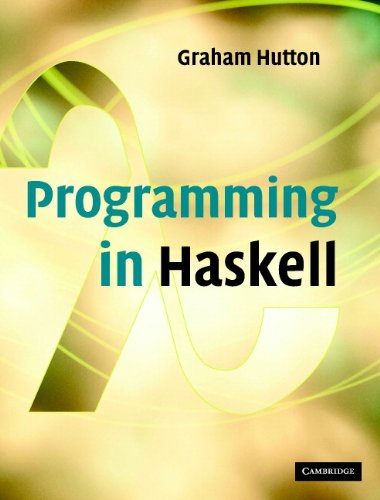Programming in Haskell book
Par johns mary le samedi, novembre 19 2016, 03:31 - Lien permanent
Programming in Haskell by Graham Hutton


Download eBook
Programming in Haskell Graham Hutton ebook
Publisher:
ISBN: 0521871727, 9780511296154
Format: pdf
Page: 184
Hey everyone — sorry it's been a while since my last post. Last year, I gave you the terrifying Truth about Scala. This post assumes some familiarity with Haskell, functional, and imperative programming. Imagine you want to make a game in a functional language like Haskell. Its main strengths are its functional paradigm, its purity which implies immutability, and a strong type system. On Sunday, I was reading about arrows in Haskell, and I noticed that these diagrams of the primitive arrow functions looked rather like diagrams of data flow in concatenative (stack-based) languages. My choice is R (with ggplot2) and have started to learn it. Dynamic programming is a weirdly named way to speed up (complexity-wise) recursive algorithms. Is it time to hire you some Haskell? The complete article can be seen as a kind of literate program. Recently I got some time to learn data visualization, as a kind of replacement for Excel's Chart. My thoughts on why Functional Programming and Haskell can be tough to learn. In this blog post, I want to demonstrate that Haskell as supported by the Glasgow Haskell Compiler (GHC) can give us almost the same features. It seems that some stuff that is in LYAH is not here. Abstract: We aim for composing algorithmic music in an interactive way with multiple participants. Programming in Haskell covers rather basic material. While choice of programming language has many obvious technical impacts on the development process, it also has a huge impact on your recruitment efforts. I welcome Clojure, Haskell, F#, OCaml, even Coq. But that was just a small piece of the functional programming world. Haskell has the reputation of being one of the most advanced programming language of our time.